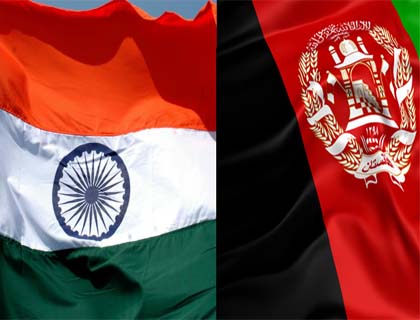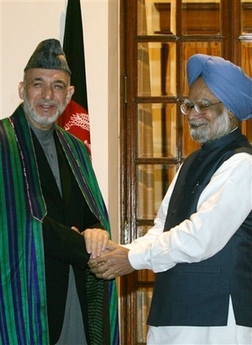by G Parthasarathy


THE Air India flight from Kabul to New Delhi on September 5, in which I had travelled, had just landed when I was told at the arrival hall that Sushmita Banerjee had been brutally murdered by the Taliban in retribution for her expose of Taliban atrocities against women. The brutal murder again exposed the medieval and murderous characteristics of the Taliban with whom the US is almost desperately seeking “reconciliation.” This, after the Taliban, operating largely from bases in Pakistan, has killed 2,161 American combat personnel and wounded 19,080. What I found in a five-day visit to Afghanistan is that it is a country with unlimited opportunities for development and democracy, even while facing a brutal insurgency fuelled and funnelled from across its borders with Pakistan.
Pakistan is an object of hate and derision across the country. Visitors from Pakistan in Kabul often prefer to describe themselves as “Hindustani” in Kabul’s bazaars.
- In just over a decade after the medieval Taliban was ousted, Afghanistan has seen a remarkable political and social transformation.
- The country has since developed a robust political system. President Karzai and his ministers are freely criticised.
- The media is free and lively. Shahrukh Khan and his “Chennai Express” receive rave reviews.
- While schools were virtually defunct and women denied the right to education and work in the Taliban years, there are now 10.5 million students in educational institutions, with universities now flourishing in Kabul, Nangarhar, Khost, Herat and Balkh.
- Forty-eight per cent of all doctors and 60 per cent of teachers are women, who now are also well represented in the legislature and even in the army and the police.
Afghanistan is now preparing for the Presidential elections scheduled for around April, 2014. With President Karzai constitutionally ineligible for a third consecutive term, jockeying has commenced for who should succeed him.

- Afghanistan has traditionally been ruled by the dominant Pashtuns, with the Tajiks, Hazaras (predominantly Shia), Uzbeks and Turkmens who constitute over 50 per cent of the population, forming alliances to protect their interests.
- Powerful regional leaders with significant armed cadres like Mohammed Atta in Mazar-e-Sharif and Ismail Khan in Herat will have a significant say in any outcome.
- This jockeying for viable coalitions will continue till the Presidential elections are held.
President Hamid Karzai
- President Hamid Karzai, derided by the Americans and their British camp followers, deserves high praise for the way in which Afghan democratic institutions have been nurtured, ethnic, sectarian and religious pluralism respected and the state and educational institutions developed, in his 11 years as President.
- Even the miniscule Sikh and Hindu communities are now represented in Parliament.
Role of US - post 2014
- There are understandable suspicions in Afghanistan about the future American role after they end their combat operations in December 2014.
- Recognising their economic and military vulnerabilities, Afghans realise that they will have to conclude a security pact with the Americans, giving the Americans more than half a dozen air bases, if they are to secure American and western economic and military assistance.
- It will require at least 10 years of relative peace for the Afghans to become economically self-reliant, by developing their agricultural and mineral potential.
- What is most worrying for the Afghans is the American policy of supplying their armed forces only weapons with limited firepower, while denying them artillery, tanks and other heavy weaponry, which they possessed earlier, but were destroyed by the Americans shortly after they arrived.
- This is a source of deep anger and anguish as Afghanistan's ill-equipped armed forces are taking huge casualties as they confront the Pakistan-backed Taliban.
- American policies are widely seen as a deliberate ploy to force the Afghans to “reconcile” with the Pakistan-backed Taliban and Haqqani network with Pakistani "facilitation".
Feeling of a Afghan for Pakistan and India
- While the Afghans are seeking good neighbourly relations with Pakistan, the overwhelming view is that there will be no change in Pakistan's malevolence in the near future.
- In contrast there is huge admiration and affection for India with public opinion polls indicating that India is the most highly regarded country, by 74 per cent of Afghans polled. Ninety-one per cent of Afghans polled have an “unfavourable” view of Pakistan, with 58 per cent regarding the Taliban as the “biggest danger” to their country even when including local warlords, drug smugglers and the US.
- India's economic assistance and political non-interference have played a crucial role in this.
- But this favourable perception is slowly changing, primarily because of India's refusal to provide any military equipment to the Afghan army, which has deliberately been kept inadequately equipped.

Role of Russia and Iran from Indian point of view !
- With Russia now poised for a larger economic role and ready to supply military equipment on commercial terms (something the Afghans cannot afford), it is time to review our approach of dovetailing our policies almost totally with those of the US and worrying needlessly about Pakistani reactions to our policies, which are, in any case malevolent, and will remain so.
- New Delhi must shed its pusillanimity on relations with Afghanistan.
- Prime Minister Manmohan Singh should personally get President Putin’s concurrence for transferring military equipment of Soviet origin like India’s older T 62/T 55 tanks and MiG 21/23 fighters to Afghanistan.
- It is also shocking that while we have supplied 105 mm Field Guns and Howitzers to Myanmar, we are seeking every conceivable excuse to refrain from doing so to Afghanistan.
- Arms transfers have to be complemented by an institutionalised tripartite India-Russian-Afghanistan dialogue on security issues so that proposals for promoting security cooperation are expeditiously implemented.
- There is also need to reach out to Iran, activating the India-Iran-Afghanistan tripartite dialogue on the development of Chahbahar port and road communications between Iran and Afghanistan.

Any Indian visiting Afghanistan cannot but be proud of the sterling role of our diplomats who live barricaded, under a heavy security cover. Particular tributes need to be paid to successive Ambassadors” — Vivek Katju, Rakesh Sood, Jayant Prasad, Gautam Mukhopadhyay, Amar Sinha — and their diplomatic colleagues, military staff and the ITBP security personnel. Likewise, the role of our diplomats living in a challenging environment in Kandahar, Jalalabad, Herat and Mazar-e-Sharif deserves high praise. These are all individuals who have soldiered on bravely, leading spartan lives, away from their families, in the face terrorist threats. Similar tributes have to be paid to all those engineers, doctors and construction workers who have done India proud in Afghanistan. Those who have sacrificed their lives in this effort should have their names engraved on the premises of India’s new Chancery building. Their selflessness should spur others to join the effort to make Afghanistan and our neighbourhood free from the scourge of Pakistan-sponsored terrorism.
